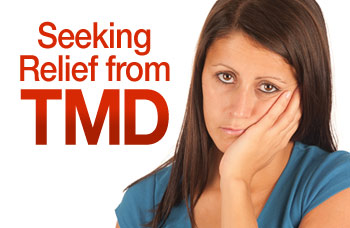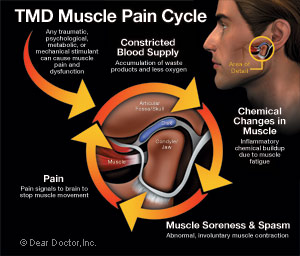Seeking Relief from TMD
What You Should Know About Treatment For Temporomandibular Disorders (TMD)

You have probably heard the terms “TMJ” or “TMD” used in various conversations or even in the media. TMJ is an abbreviation for Temporomandibular Joint, which is the formal name for your jaw joint(s). TMD stands for Temporomandibular Disorders, which is a collective term for the muscle and/or joint symptoms that commonly arise when there is TMJ pain and dysfunction. The dental profession is in the midst of a transition regarding TMD treatment. This has stirred up a controversy within the profession over how best to relieve TMJ pain. On one side you have those subscribing to the newer methods of conservative, less invasive approaches; on the other side you have those who are sticking with more traditional and often irreversible treatments. Therefore, what happens to you if you have a TMD problem could depend on whom you consult for diagnosis and treatment. That's why it's so important for you to become an educated consumer regarding this particular type of healthcare.
What follows is a summary of what we know about TMD based on the scientific evidence; what you should do if you have TMJ pain or symptoms; what types of dentists you should look for to treat you appropriately; and what issues you should discuss with the dentist you choose.
 |
| TMD Muscle Pain Cycle
Click to enlarge |
Unique Joints
The temporomandibular joints connect your mandible (lower jaw) to your skull on both left and right sides, which makes the lower jaw the only bone in the body with completely symmetrical joints at both ends. There is a ball-and-socket relationship between your jaw and your skull on both sides, but the unique part is the presence of a cushioning disk between the two surfaces in each joint. Each TMJ has a disk between the ball (condyle) and socket (fossa), and this sometimes ends up being an especially important area when trouble arises.
TMJ Problems
The formal name for TMJ problems is Temporomandibular Disorders, or TMDs. Using the term TMDs allows us to point out that there are several different kinds of problems. This fact has huge significance when it comes down to what happens when things go wrong, and what can be done about it, since the nature of the problem will often differ greatly from one TMD sufferer to another.
Because there are different approaches to the management of TMD problems, not all of which are based on science, caution is advised when seeking professional help. People may be surprised to find that their personal dentists often do not feel comfortable with diagnosing or treating TMD problems, because it was not a well-covered topic during their dental education. The American Dental Association (ADA) does not recognize a specialty in this area, and therefore your dentist may have difficulty finding a knowledgeable and up-to-date TMD dentist to whom you can be referred for help. The most qualified dental practitioners in this area are those who have completed postgraduate programs in Oral Medicine or Orofacial Pain, but the number of such trained dentists is not very high in the USA currently.
You might think that using the internet to search for the right dentist would be helpful, but one needs to be wary; websites related to TMD usually are either advertisements for a particular dental practice or they contain misinformation, or both. Many of these sites describe an incredible array of so-called “TMJ symptoms” that range from all sorts of headaches to lower back pain, but most of these problems are not truly related to any temporomandibular disorder. So what should you do?




